Sex work and the devastation of stigma in South Australia
The debate over decriminalising sex work in SA looms large in state parliament — this week, the Sunday Mail explores how archaic legal principles devastated the lives of women in the 1800s.
SA News
Don't miss out on the headlines from SA News. Followed categories will be added to My News.
Sex workers are unfairly targeted by the same archaic legal principles that devastated the lives of women in the late 1800s — says the great, great niece of an Adelaide prostitute left destitute, institutionalised and buried in an unmarked grave in West Tce Cemetery.
Robyn Hukin is trying to track down the descendants of the daughter unlawfully removed from her great, great aunt Johanna Brans.
She says the ripple effects of the societal edicts and laws punishing sex workers are still being felt 130 years after Johanna’s death.
“I can’t believe we are still talking about decriminalising prostitution,” Mrs Hukin says.
South Australia has among the toughest laws against sex workers.
Last month, the state came a step closer to prostitution law when a Bill for the decriminalisation of sex work was passed with amendments in the Legislative Council.
The Bill, introduced by Greens MLC Tammy Franks last year, will now be debated in the House of Assembly.
Mrs Hukin, the director of a Perth-based digital consultancy, has been researching her family’s history over the past 30 years and unwittingly uncovered the appalling circumstances under which at least two of her female ancestors lived and perished
She has spent years trawling through hundreds of SA historical references, state records, police reports, court documents and newspaper clippings without one family photo of Johanna to go by.
Attempting to unravel the plight of her great, great aunt became an “obsession”, she says.
“Women like Johanna lived tragic lives in and out of jail, with children removed into state care and never seen again.
“They were at great risk of disease and abuse all because they were women often left to fend on their own with little or no education, or rights, after being rejected by violent husbands, their families and the law.”
Their lives often ended alone as social outcasts, she says.
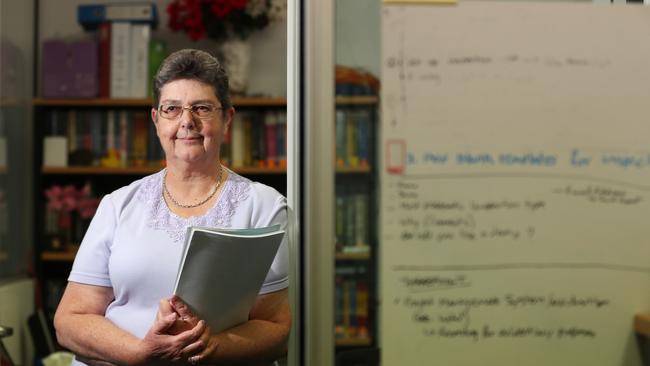
Johanna died from tuberculosis aged 35 on New Year Eve 1889 and was buried at West Tce Cemetery.
Her grave is part of a historic trail developed by the cemetery trust.
Her younger sister, Mary Jane, followed her to the grave four months later. Mary Jane’s final resting place was in a communal pauper’s grave in West Tce, with hundreds of others.
It was Mary Jane who introduced Johanna to sex work after Johanna and her young children Magnus and Johanna Jr were thrown onto the streets by her abusive husband Charles Brockman in January 1877.
Brockman refused to pay maintenance to support his children, physically abusing Johanna after she sought his help, a court document reveals.
Police records show Johanna and the children were forced to live in a Port Adelaide brothel with Mary Jane and it was here that Johanna fell into the sex trade to feed her children.
Her father had remarried and her stepmother disowned her.
Johanna was in and out of Adelaide Gaol for loitering with intent, drunkenness and indecent language.
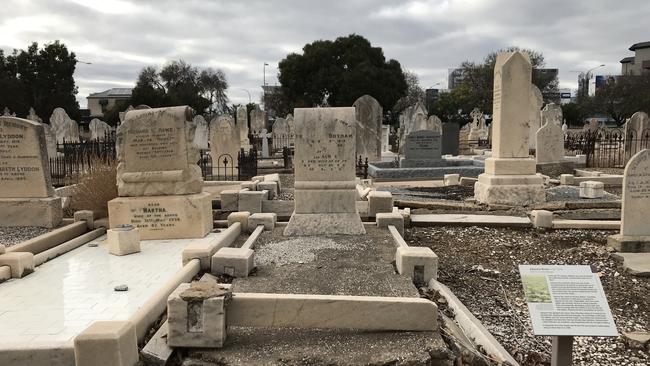
Her list of convictions, now almost received fortnightly, included failing to pay a fine to the Health Board for living with her children and two other women in a tiny Glanville lean-to unfit for habitation.
Threatened with the removal of her children if they continued to live in the Port Adelaide brothel, Johanna had sought refuge in the lean-to.
Confined to the Destitute Asylum by pregnancy with an illegitimate child, Johanna was unable to work and therefore pay the Health Board fine.
She was imprisoned with her newborn son Alfred, and Magnus and Johanna Jr were placed into temporary state care.
Just over a year later Alfred died and Magnus and Johanna Jr were permanently institutionalised like all of the state’s wards up until the age of 16, if not adopted earlier.
It was the last time Johanna saw her daughter, who was illegally adopted out of the state without her knowledge.
Authorities told Johanna that her daughter had died.
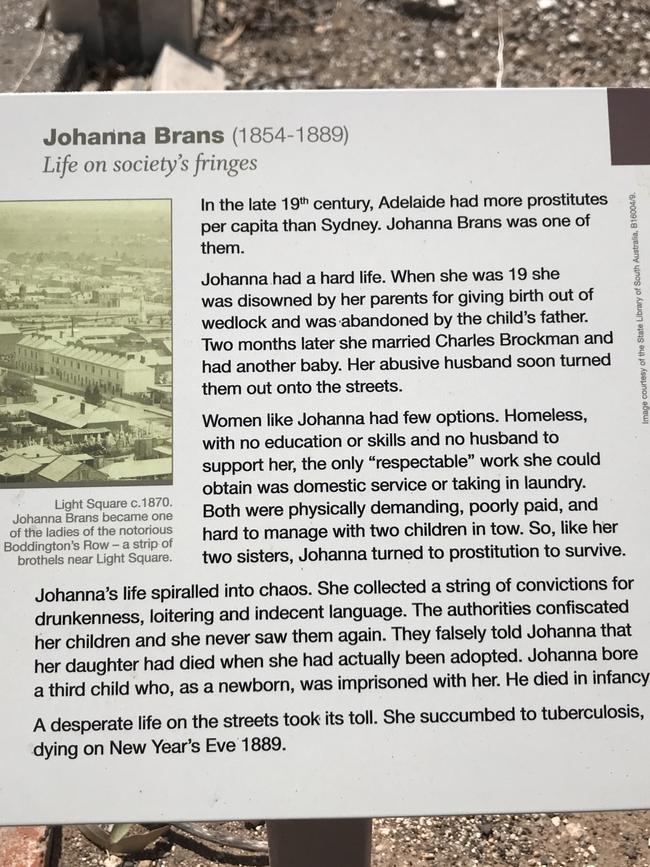
Johanna Jr was instead taken by her foster parents to New South Wales, where she married in 1893 as Johanna Scudamore. She died in Sydney in 1945, leaving two daughters.
The daughters’ whereabouts and that of their direct descendants remain unknown to the family, says Mrs Hukin.
“This child (Johanna Jr) grew up never knowing her mother.”
Johanna’s son Magnus died in Broken Hill in 1934. He married but had no children.
Less than two years after losing all three of her children, Johanna tried to commit suicide while in police remand.
After that, Mrs Hukin says Johanna eventually ended up at a notorious group of brothels called Boddington’s Row. Boddington’s Row was described in an 1877 newspaper as “a line of cramped, filthy hovels lying in a long, narrow yard between Hindley St and Hawdon streets”.
“The floors were rotten and in yawning holes, which were partially filled by what seemed to be house refuse,” the newspaper report went on to say.
Mrs Hukin says her research has highlighted not only the treacherous working conditions of unregulated sex workers in the 1800s but also the existence of a prostitute class-system in Adelaide at the time.
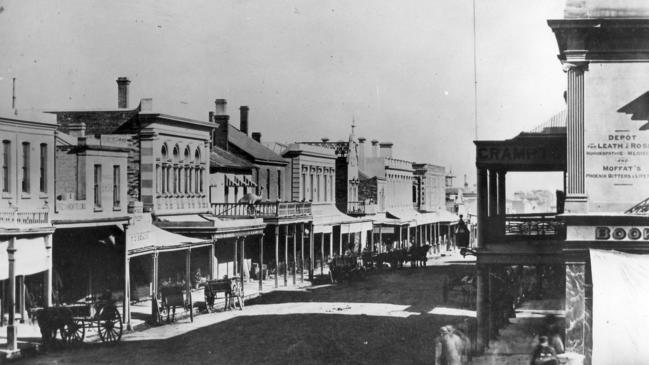
There were, she says, the “better” class ladies of the night who wore red satin dresses and white gloves at the Theatre Royal Hotel, on Hindley St.
These women were said to have made a good trade on theatre night.
And there were the “street walkers” who were found in alleyways and dark parks — servicing the working men on their way home to their wives after the last shift usually ended around 7pm.
“These women were thrown into prison and the men got off scot-free — not much has changed really,” Mrs Hukin says.
“They were the women hard done by most — the women who used prostitution to escape homes of oppression, alcoholism and sexual and physical abuse who had no other means to earn a living.
“For many young women in these circumstances, prostitution was at the time their only way to earn some quick profits to set up a small business of their own.
“Most of them didn’t remain prostitutes for long, either finding better circumstances or dying at a young age from working conditions that were not conducive to good health.”
Mrs Hukin says her family research has been “heartbreaking”, illuminating and disturbing — often raising more questions than answers.
The biggest one being what ever happened to Johanna’s descendants? Are they aware of her tragic past or even of her existence?
THE CASE OF LEGALISING SEX WORK
By Nathan Davies.
Sex work should be legalised, not decriminalised, according to Adelaide’s most famous former madam Stormy Summers.
Ms Summers, who ran Stormy’s brothel on Light Square for decades, said sex work should be completely legalised for the safety of both sex workers and the general public.
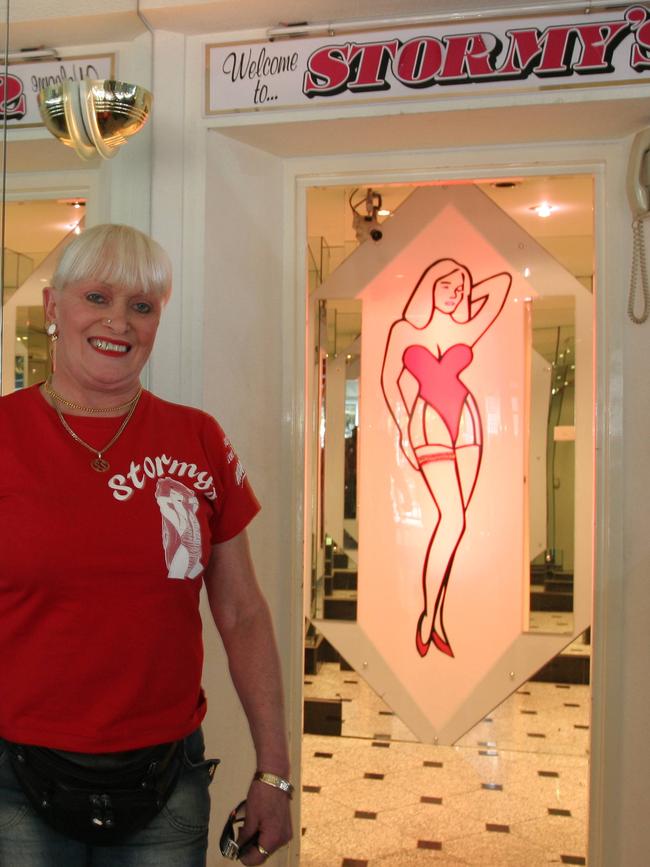
“Decriminalisation? That just means you can have two girls working out the front of your house, and nobody wants that,” Ms Summers said.
“Imagine an elderly couple with two hookers working on their road. That’d be a terrible thing.
“Same with girls working near schools.”
Ms Summers, who gave her age as “21, love”, said full legalisation of sex work would help both the workers and their customers.
“You have to look at the dangers of girls working on their own,” she said.
“No, what we need are safe houses where the girls can work in safety. If it’s decriminalised then there’s no control over health checks, nobody even knows if condoms are being used.”
Miss Summers, who said she’s long retired from the industry, said she “ran a good house” at Stormy’s and had only occasional run-ins with the police and authorities.
“I don’t really know what’s going on in the industry anymore, I have nothing to do with it these days,” she said.
“But I do think you should have to apply for a licence to run a house, and the fees for that licence should be kept low to keep the criminal element out of it.”


